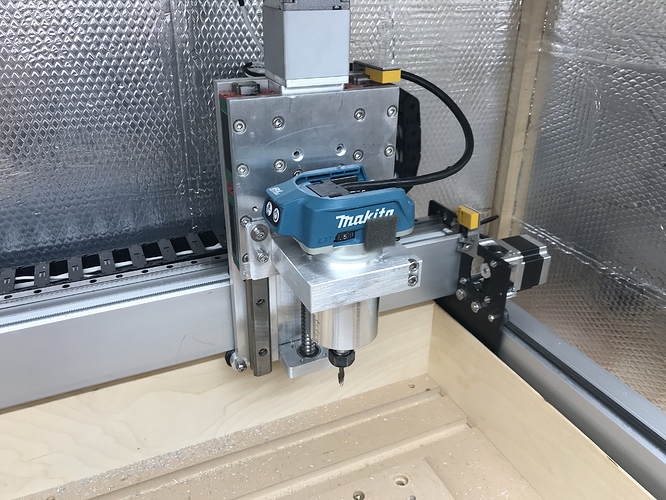No, but I have a Makita. When it needs brushes and/or bearings my plan is to buy an MLCS Rocky 30 in addition to the parts so I can have a spare.
OK!!
The MLCS Rocky 30 looks like a very inexpensive copy of the Makita, even the parts diagrams are virtually identical. I didn’t find any claims of closed loop speed control, but the speed controller looks identical to the Makita’s, which reportedly has it. Although only 1 hp is claimed, that’s likely plenty for the Shapeokos. Does the Makita adapter ring support its 2.5 inch diameter? Can the Shapeoko 3 properly support its length?
It’s my understanding that it’s identical to the Makita, save for the plastic molding at the top and the positioning of the controls — need to get one to verify that.
EDIT: but as was pointed out, the MLCS Rocky 30 skimps on feedback speed control
It apparently doesn’t have closed loop speed control like the Makitas and Dewalts do. My Bosch EVS1617 doesn’t either.
I will give my vote for the Makita, it works well, it is reliable Probably more than the Dewalt), is supported in the Shapeoko and provides a wide range of speed. I have one in the Shapeoko and one to use as a small router. I have not yet felt any need for additional power and if I did, I would probably get a spindle. I think that unless you have an HDZ upgrade, you would not reach the limit of the Makita router and why go with something where you are the only one using it unless it has special features not found in other supported router/spindle?
The Carbide Compact Router is not an MLCS Rocky 30 — we chose the more expensive board option with feedback speed control.
Don’t forget the brushless Makita XTRO1Z.
30k plus rpm, no brushes to wear out.
Works pretty good in aluminum.
Still a bit of a WIP. More to report later.
Does it fit in the RT700/701 mount?
Exact same body dimensions
Did you use the Makita XTRO1Z in this video?
I guess that Carbide Compact Router also has the rotor parts that are missing from Rocky that are required for closed loop speed control, right? Are the rest of the specs the same as Rocky’s?
It looks like the Makita XTR01Z is also the DRT50ZX4. I have found the DRT50ZX4 is the cordless Brushless router available at retailers in Canada and several other countries.
Is the 18V adapter included or a separate purchase?
From a power perspective, is it similar to the RT700/701?
Luc, this is the ps I’m using.
LETOUR LED Power Supply 24V 20A 500W AC 96V-240V Converter Adapter DC S-500W-24 Power Supply for LED Lighting,LED Strip,CCTV (24V 20A 500W) https://www.amazon.com/dp/B01HTF1Q06/ref=cm_sw_r_cp_tai_nh0UCbN28PDYR
In my non scientific opinion, the brushless is not as powerful as the AC routers. I have no way of measuring.
I can tell you I use a 3/8” shaft, 3/4” 2 flute facing mill pretty frequently with good results.
Thanks, I was curious. The advantage then is that you would not need to change the brushes. I have ordered the 3/8 collet for the RT700/701, it has arrived at the store and I have to pick it up next week. I also purchased some bits for aluminum so I will be able to give milling aluminum a try.
According to Janet and Joe, brushless DC (BLDC) motors are about 10% more efficient than router universal motors. So, assuming your Makita BLDC can use the 500 Watts your power supply is capable of, you should have the equivalent of a 550 Watt (“0.74 HP”) AC powered router. The “1.25 Maximum HP” Makita RT0701C’s specified current draw is 6.5 Amps, presumably at 115 Volts, so it’s a 748 Watt (“1 HP”) router.
So @gmack, what role does DC voltage play? The brushless is listed at 18 volts, 18v 5 cell LiPo batteries typically charge to 21.5v. I’ve got the PS set to 22v. Any advantage to running it at its max of 26.3v?
Power (Watts-W) = Voltage (Volts-V) * Current (Amps-A). Apparently your power supply is limited to 20A maximum. So, at 26.3V, it should be able to put out 526W. IMO, you run the risk of breaking the router electronics at that voltage for negligible gain.
I doubt that the router can even use 20A since it’s normally used with a 5 Amp-hour (AHr) battery. That battery should be able provide 0.5A for 10 hours. It will provide far less than 20A for 0.25 hours (15 minutes) due to internal resistance/heating.
Awesome! Looks like there’s an adaptor in the battery slot? Where can I buy it? Thanks!

